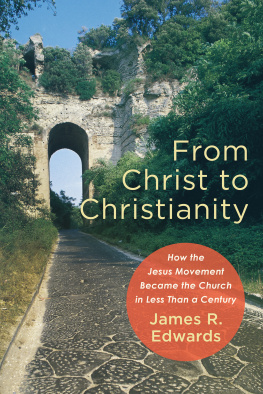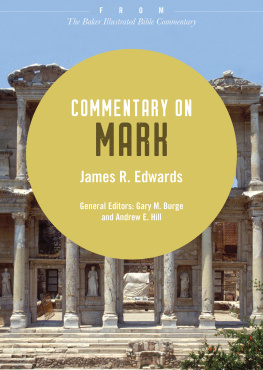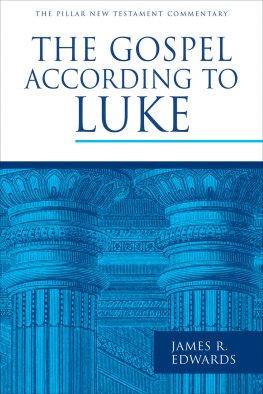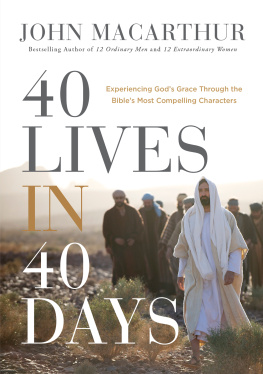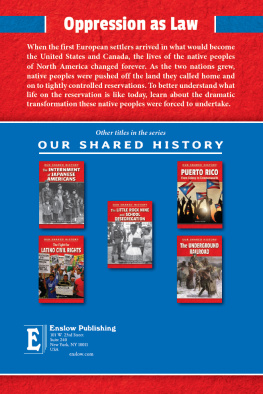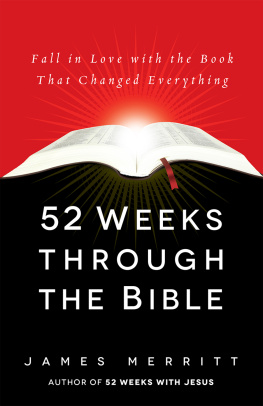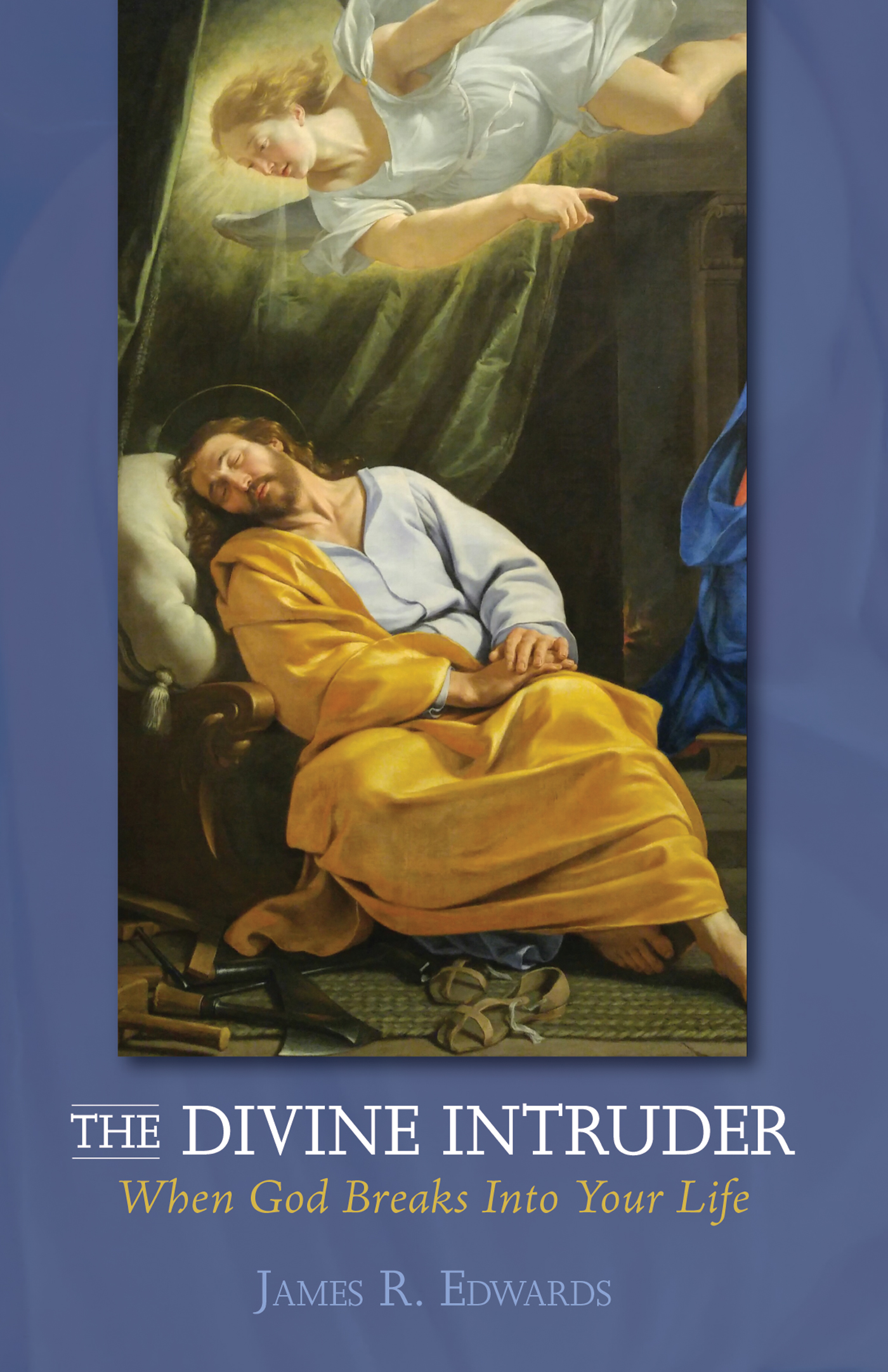The Divine Intruder
When God Breaks Into Your Life
James R. Edwards
Disillusionment with God
The Lord appeared to Abraham near the great trees of Mamre while he was sitting at the entrance to his tent in the heat of the day. Abraham looked up and saw three men standing nearby. When he saw them, he hurried from the entrance of his tent to meet them and bowed low to the ground.
He said, If I have found favor in your eyes, my lord, do not pass your servant by. Let a little water be brought, and then you may all wash your feet and rest under this tree. Let me get you something to eat, so you can be refreshed and then go on your waynow that you have come to your servant.
Very well, they answered, do as you say.
So Abraham hurried into the tent to Sarah. Quick, he said, get three seahs of fine flour and knead it and bake some bread.
Then he ran to the herd and selected a choice, tender calf and gave it to a servant, who hurried to prepare it. He then brought some curds and milk and the calf that had been prepared, and set these before them. While they ate, he stood near them under a tree.
Where is your wife Sarah? they asked him.
There, in the tent, he said.
Then the Lord said, I will surely return to you about this time next year, and Sarah your wife will have a son.
Now Sarah was listening at the entrance to the tent, which was behind him. Abraham and Sarah were already old and well advanced in years, and Sarah was past the age of childbearing. So Sarah laughed to herself as she thought, After I am worn out and my master is old, will I now have this pleasure?
Then the Lord said to Abraham, Why did Sarah laugh and say, Will I really have a child, now that I am old? Is anything too hard for the Lord? I will return to you at the appointed time next year and Sarah will have a son.
Sarah was afraid, so she lied and said, I did not laugh.
But he said, Yes, you did laugh.
Genesis :
A braham is sitting in the doorway of his tent at midday, thinking. He wishes his life had turned out differently. A sinking disillusionment settles in his stomach as he realizes that he is old. The ideals and hopes of earlier years have passed him by.
According to custom older than memory itself, he has positioned his tent a few paces away from the trade route. The place is Hebron, a caravan junction where a few oaks huddle near the west side of a plain surrounded by a semicircle of hills. Northward, in the direction of Damascus, is Abrahams birthplace, Ur of the Chaldees. To the south lie Beersheba and the Sinai desert. Abraham is looking not to the north or south, however, but to a point not found on the compass: he is looking to the past.
For the ten-thousandth time, he is pondering the ways of the Almighty. Abraham had become a wanderer late in lifenot because he was a nomad in the true sense of the word, but because he believed God had called him to such a life. Compared to cosmopolitan Ur, the places he now frequentedHebron, Ziph, Gerarwere as nothing. Never would he have chosen such a desolate existence had he not a burning conviction that his migration to Canaan was Gods will. In his younger years, perhaps, the prospect of sojourning in Canaan might have held a certain fascination for him. But in his mature years, his wanderings were the result of obedience to a divine imperative rather than a choice on his part. For reasons that were no longer clearif they ever had beenAbrahams life had taken turns quite at odds from what he had once been, from what he would have chosen. To receive a great name, to become a great people, to inherit a great landthis was his and Sarahs destiny.
Or rather, that had been their destiny, withered now by long years of unfulfillment. In bitter moments, Abraham doubted whether the Almighty had called him at all, perhaps even whether the Almighty existed. But whenever he replayed his lifes story as he now did from the doorway of his tent, the presence of God was there. Undeniably, his destiny was not his choice but Gods promise, made before he ever set foot on the mountains and valleys, the crags and oases of Canaan. Still, the terrible dilemma of faith remained. Could Abraham trust the promise of God that kept repeating itself in his existence, or would he succumb to the obvious evidence of his own advancing age and Sarahs inability to bear children?
His experience was a riddle. It was like coming to an impasse in a maze, or groping in the dark for something that could not be found. The riddle was the more perplexing because in everything the Almighty had been faithful... except in the one thing that mattered most: the birth of a son, an heir to the promise. Abraham and Sarah could surely be forgiven if on occasion they had resorted to scheming in order to help God make good on his promise. Sometimes it seemed that they, mere mortals, might be more effective in fulfilling the promise than the Almighty. What could be wrong with meeting God halfway? With proposing Eliezer, steward of Abrahams house, to fulfill the role of a son, for example? Or with Abrahams fathering a child through Sarahs maid, Hagar? But all their stratagems failed, for God was intractable and would accept no surrogate sons. The impasse of Gods unfulfilled promise loomed ever before Abraham and pushed his faith to the brink of despair. From the doorway of his tent, how perilously close faith and despair seemed.
It was to a man with such thoughts that something extraordinary happened: The Lord appeared to Abraham near the great trees of Mamre while he was sitting at the entrance to his tent in the heat of the day. To Abraham, it appears that he must resolve the bitter ironies of life on his own. But there is more to faith than is apparent to Abrahams mind. He is not alone. A visitor is at hand, even if the exact identity of that visitor at first escapes him.
To be sure, it was God who appeared to Abraham. Gods appearance, however, has nothing to do with Abrahams hospitality. Nor is Abrahams meeting with God something he has conjured up; it is not the result of a momentous resolve on his part, much less a scaling of the ladder of mysticism. He is simply an elderly man with an elderly wife who has tried as best as he could to be obedient to his understanding of Gods will.
But it is not God whom Abraham recognizes. Looking up, he simply sees three men standing nearby. Where had they come from? Has Abraham been so lost in thought that their approach across the lonely expanse has escaped him? It is not normalor safefor a Bedouin to be taken by surprise. Before he knows it, they are standing before him, expecting to be received. And nearly as suddenly, Abraham is on his feet, as much from consternation as from hospitality, bowing low in honor and defenselessness before his guests, allaying any suspicions of hostility on his part. If I have found favor in your eyes, my lord, do not pass your servant by, responds the patriarch. No sooner said, he arouses the camp in a fever of errandsthe fetching of water, curds, and milk, the preparing of cakes and bread, and the slaughter of a young calf from the herd.
Gods appearance in the form of Three Strangers raises the curtain on the greatest act of the divine dramathe incarnation, or enfleshment, of God in human form. The act will reach its climax in Jesus of Nazareth, but from the outset of the biblical record there are hints or foreshadows of it. From time to time we are told that the Director steps onto stage himself, although seldom in a leading role. More typically it is a quite insignificant parthere, three unnamed strangers; much later, a carpenter from Galilee. God incognit o God in disguiseis one of the recurrent surprises and mysteries of biblical faith.



